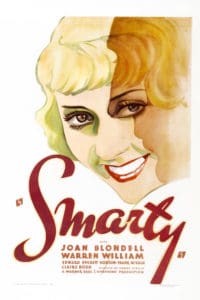What well-known lawyer just secured a divorce for a well-known woman – just married that well-known wife?
Joan Blondell was one of the stalwart stars of the 1930s, especially the pre-code years. Never one to cause a scene (at least at the studio) she often times did over a dozen films in a single year, with her busiest years being in the early to middle portions of the decade. She worked steadily even after leaving Warner Brothers in 1939, transitioning to supporting role in the mid 1940s and even to television, while still maintaining an active presence on the big screen. Among her final roles was a turn in the 1970s musical Grease.
1934’s Smarty is one of her smaller films, with a blazingly short run time of a mere 65 minutes. Perhaps rushed out to capitalize on the waning days of the pre-code era, Smarty dabbles in the more risqué topics which were popular in the era, and throws in a few more. Here we get infidelity, alcohol abuse, domestic abuse (or perhaps something kinkier), and impotence- with a few minutes to spare.
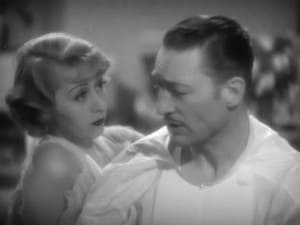 Like most of her roles from the era, here Blondell is again the flirtatious and alluring blonde. Her character Vicki is manipulative and deceitful, playing the men in her life against each other. We open with she and her husband Tony (Warren William) preparing for a dinner party which they are hosting for the friends lawyer Vernon (Edward Everest Horton), George (Frank McHugh) and Anita (Claire Dodd).
Like most of her roles from the era, here Blondell is again the flirtatious and alluring blonde. Her character Vicki is manipulative and deceitful, playing the men in her life against each other. We open with she and her husband Tony (Warren William) preparing for a dinner party which they are hosting for the friends lawyer Vernon (Edward Everest Horton), George (Frank McHugh) and Anita (Claire Dodd).
Over a game of bridge, Tony comments that he is ‘impotent with rage,’ with his wife. “Oh, you mean like diced carrots?” Vicki cooly comments in reply. Before you can blink Tony’s smacked her a good one, she’s lawyered up with pal Vernon, and Tony’s got an overnight bag packed for who knows where.
Though remorseful, Tony agrees to the divorce which is duly concluded. Shortly thereafter Vernon and Vicki are married themselves, and she begins prodding him in much the same way. In the first visible sign she pulls him from a meeting with some new clients (who have a similar situation to what he helped his new wife escape) to watch her buy some new dresses. Only she is very late and then purchases the very dress he forbade her!
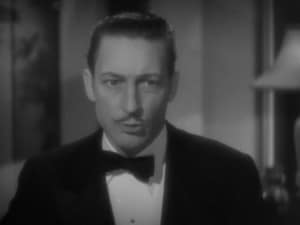 While this is going on Tony’s set up in a new apartment- complete with butler- and begins rampant drinking and womanizing. He’s set a date with a woman he knows is married when he gets a call from Vicki inviting him over to dinner with the same group as before, only now of course the roles are reversed and he is no longer the husband. He brings his married friend along, but leaves her to head upstairs on arriving to chat with his ex.
While this is going on Tony’s set up in a new apartment- complete with butler- and begins rampant drinking and womanizing. He’s set a date with a woman he knows is married when he gets a call from Vicki inviting him over to dinner with the same group as before, only now of course the roles are reversed and he is no longer the husband. He brings his married friend along, but leaves her to head upstairs on arriving to chat with his ex.
Shortly Vernon arrives and confronts Tony and Vicki – in Tony’s defense he’s been refusing each one of Vicki’s tempting invitations- and a heated debate ensues. We see Vicki begin to goad Vernon in much the same way she did Tony, until finally he smacks her as well. Everyone heads their separate ways; Tony back to his apartment to consume his tryst with his married acquaintance and Vernon begins to search madly for Vicki. Unbeknownst to all, she’s snuck into Tony’s apartment.
After another argument at Tony’s where Vernon and Vicki agree to divorce, Tony finds himself alone with Vicki again. He asks her to leave, but not after smashing a jar of diced carrots (perhaps symbolically) into the floor and ripping Vicki’s scanty dress from her, revealing an even scantier undergarment underneath.
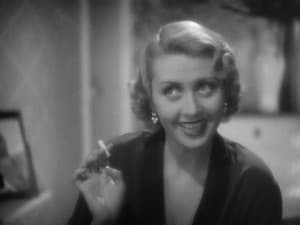 At each step, we can see Vicki’s face lighten with glee and excitement. Tony hits her again and her eyes sparkle and she laughs as he pulls her hair. Picking her up, he carries her back to the bedroom as the curtain falls and we presume they are back together.
At each step, we can see Vicki’s face lighten with glee and excitement. Tony hits her again and her eyes sparkle and she laughs as he pulls her hair. Picking her up, he carries her back to the bedroom as the curtain falls and we presume they are back together.
Smarty leaves one with a bit of a bad taste in one’s mouth as a result of the hitting- there is even a reference to Blondell’s earlier film The Public Enemy and the (in)famous grapefruit scene. The rest of the film, though running with a tired plot and clearly shot in a fast in economical manner, has some things going for it.
Blondell is clearly the start here, with her name appearing before all others and her character driving the action. If there is a mitigating factor for Vicki’s demeanor- though a slight one- it is that she is clearly instigating (and enjoying highly) her ability to make the men in her life do things they clearly don’t (and given their remorse probably would not) want to do. A power play by a strong-willed woman? Perhaps. Do this make it justifiable? Perhaps not.
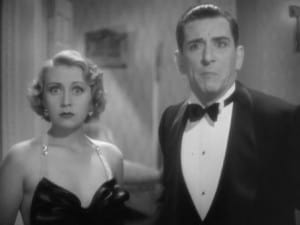 The banter and dialogue witty and at times a bit cutting, which drives interest. Running only over an hour, there is little time wasted and the entire film really consists of only four or five key scenes; even the short blurb in the courtroom is even a throwaway as the divorce could be easily explained in a sentence or two in any case.
The banter and dialogue witty and at times a bit cutting, which drives interest. Running only over an hour, there is little time wasted and the entire film really consists of only four or five key scenes; even the short blurb in the courtroom is even a throwaway as the divorce could be easily explained in a sentence or two in any case.
Blondell and William were paired several times throughout their career and they obviously share a certain chemistry. What does help Smarty is the three main supporting characters. Claire Dodd, also a frequent cast member in many pre-code films, almost supports Vicki’s stance on taking a smack or two, but serves mainly to provide the viewpoint of a slightly older divorcee.
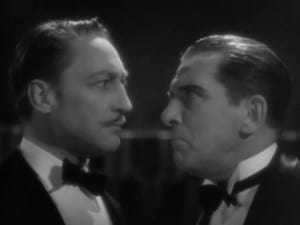 Edward Everett Horton as Vernon is almost ghastly white and is presumably intentionally so. His earnest indignation at witnessing Tony’s abuse is only surpassed by the disgust he has for himself when he repeats the error. Frank McHugh’s contributions as George are purely for comic relief, with his most ironic lines involving a bowl of pretzels.
Edward Everett Horton as Vernon is almost ghastly white and is presumably intentionally so. His earnest indignation at witnessing Tony’s abuse is only surpassed by the disgust he has for himself when he repeats the error. Frank McHugh’s contributions as George are purely for comic relief, with his most ironic lines involving a bowl of pretzels.
Most will get turned off immediately from Smarty due to the clear attitude of the female characters toward getting socked. Those who give the film a bit of a chance will see that there is more to the film than that, with much of the remainder to be enjoyable if not fine art.
